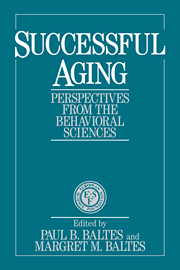Book contents
- Frontmatter
- Contents
- List of contributors
- Foreword
- Preface
- 1 Psychological perspectives on successful aging: The model of selective optimization with compensation
- 2 Medical perspectives upon successful aging
- 3 Successful aging in a post-retired society
- 4 The optimization of cognitive functioning in old age: Predictions based on cohort-sequential and longitudinal data
- 5 The optimization of episodic remembering in old age
- 6 Peak performance and age: An examination of peak performance in sports
- 7 Personal control over development and quality of life perspectives in adulthood
- 8 Successful mastery of bereavement and widowhood: A life-course perspective
- 9 The Bonn Longitudinal Study of Aging: Coping, life adjustment, and life satisfaction
- 10 Risk and protective factors in the transition to young adulthood
- 11 Avoiding negative life outcomes: Evidence from a forty-five year study
- 12 Developmental behavioral genetics and successful aging
- Name index
- Subject index
4 - The optimization of cognitive functioning in old age: Predictions based on cohort-sequential and longitudinal data
Published online by Cambridge University Press: 22 March 2010
- Frontmatter
- Contents
- List of contributors
- Foreword
- Preface
- 1 Psychological perspectives on successful aging: The model of selective optimization with compensation
- 2 Medical perspectives upon successful aging
- 3 Successful aging in a post-retired society
- 4 The optimization of cognitive functioning in old age: Predictions based on cohort-sequential and longitudinal data
- 5 The optimization of episodic remembering in old age
- 6 Peak performance and age: An examination of peak performance in sports
- 7 Personal control over development and quality of life perspectives in adulthood
- 8 Successful mastery of bereavement and widowhood: A life-course perspective
- 9 The Bonn Longitudinal Study of Aging: Coping, life adjustment, and life satisfaction
- 10 Risk and protective factors in the transition to young adulthood
- 11 Avoiding negative life outcomes: Evidence from a forty-five year study
- 12 Developmental behavioral genetics and successful aging
- Name index
- Subject index
Summary
Introduction
Social scientists who are concerned with examining the hypothesis that optimization can occur with advancing age and who direct their efforts to discover the factors that allow some but not all individuals to optimize their abilities to maintain high-quality lives generally would seem to make three implicit assumptions. The first assumption has a negative flavor: Declines from asymptotic levels attained during early adulthood are assumed to occur in old age in both biological and behavioral functioning, whether at the level of observed performance or of reserve capacity. The second assumption, by contrast, is more positive: Individuals are thought to differ widely in their adaptation to experienced losses, and patterns of individual maintenance in decline may be both varied and subject to multiple influences. The third assumption concerns the model chosen for the study of aging pheonmena: Decline with age is often thought to be gradual, continuous, and irreversible in nature. Evidence with respect to these assumptions has long been examined in the area of cognitive functioning, the topic of this chapter.
Whether older adults can maintain levels of adaptation that allow continuation of independent living and the expression of accomplishments in late life is necessarily contingent upon the maintenance of levels of intellectual functioning that have not fallen significantly below the normative levels expected by our society. It is quite true that many individuals throughout much of their life manage to cope at below-average levels of competence.
- Type
- Chapter
- Information
- Successful AgingPerspectives from the Behavioral Sciences, pp. 94 - 117Publisher: Cambridge University PressPrint publication year: 1990
- 35
- Cited by

